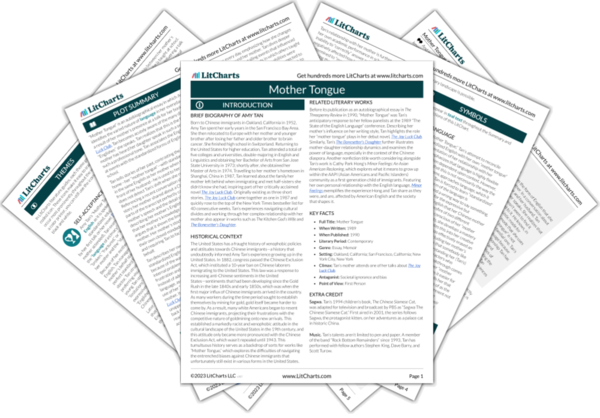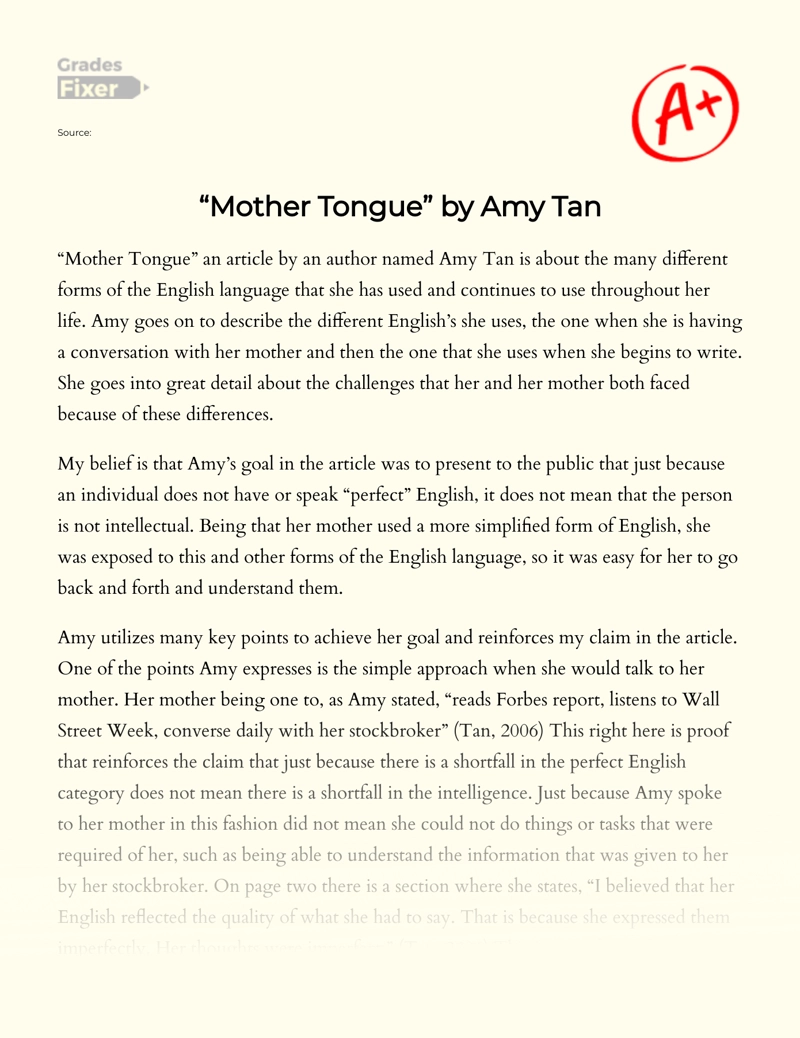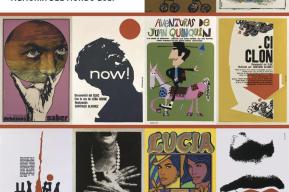

Mother Tongue Summary, Purpose and Themes
Amy Tan’s “Mother Tongue” is a compelling exploration of language, identity, and familial bonds.
This nonfiction narrative essay, which debuted at the 1989 State of the Language Symposium and was later published in The Threepenny Review in 1990, delves into Tan’s multifaceted relationship with English, influenced significantly by her mother, a Chinese immigrant.
Full Summary
The essay unfolds in three distinct sections.
Initially, Tan introduces us to the concept of “different Englishes,” a theme central to the narrative. She describes the unique form of English spoken by her mother, referred to as her “mother’s English” or “mother tongue.” This language, distinct yet familiar, bridges the first and second parts of the essay.
In the heart of the essay, Tan reflects on the profound impact her mother’s language had on her life and identity. She recalls how her mother, not fluent in “perfect English,” often depended on Tan to bridge communication gaps. This experience shapes Tan’s understanding of language and its nuances.
The essay culminates in a powerful conclusion where Tan connects the dots between her mother’s English and her own writing style and career choices. She recounts how her mother’s presence at a talk for her book “The Joy Luck Club” triggered a realization about the various forms of English she uses.
Tan contrasts the English she speaks at home, her “mother tongue,” with the standard English she learned in school and uses in professional settings. Notably, Tan shifts languages seamlessly, a transition unnoticed by others, including her husband.
Tan shares anecdotes from her past, illustrating how her mother’s language shaped her. She resists describing her mother’s English as “broken,” arguing that it implies deficiency. Instead, she views it as a reflection of others’ limited perceptions.
This perspective is highlighted by the dismissive attitudes of her mother’s stockbroker and doctors, who fail to take her mother seriously, often necessitating Tan’s intervention.
Reflecting on her own journey with English, Tan discusses the challenges she faced in school, influenced by her mother’s unique use of the language. However, this challenge becomes a source of motivation rather than defeat.
Tan’s determination to “master” English leads her to initially distance herself from her “mother tongue.”
It’s not until she begins writing “The Joy Luck Club” that Tan realizes the inaccessibility of the English she was using.
Reconnecting with her “mother tongue,” Tan finds her authentic voice—one deeply influenced and cherished, the voice of her mother. In “Mother Tongue,” Tan not only narrates her personal journey with language but also raises profound questions about identity, culture, and the intrinsic power of language.

The purpose of Amy Tan’s essay “Mother Tongue” is multifaceted, encompassing several key themes and objectives:
- Exploration of Language and Identity : Tan delves into how language shapes identity. By discussing the different forms of English she uses, she illustrates how language is deeply intertwined with personal and cultural identity. The essay emphasizes that the way we speak and the language we use are integral parts of who we are.
- Highlighting Linguistic Diversity and Acceptance : Tan challenges the notion of standard English, advocating for the recognition and acceptance of linguistic diversity. She highlights the richness and complexity of her mother’s version of English, urging readers to reconsider what constitutes “proper” language.
- Examination of Mother-Daughter Relationships : The essay is also a reflection on Tan’s relationship with her mother. Through the lens of language, Tan explores the dynamics of their bond, emphasizing how language both connects and separates them.
- Commentary on Perception and Misunderstanding : Tan addresses how people are often judged based on their language proficiency. Her mother’s experiences with her stockbroker and doctors showcase the misunderstandings and dismissals non-native speakers frequently face. The essay serves as a critique of these societal attitudes.
- Personal Growth and Self-Discovery : “Mother Tongue” is also a story of Tan’s personal journey in understanding her own linguistic heritage and how it has shaped her as a writer and individual. She discusses her initial struggles and eventual acceptance and embrace of her linguistic roots, which significantly influenced her writing style.
- Cultural Representation and Advocacy : By sharing her experiences, Tan advocates for cultural representation and the importance of diverse voices in literature. Her journey to include her mother’s language in her writing is a statement about the value of different cultural perspectives in storytelling.
1. The Complexity and Impact of Language
Amy Tan’s “Mother Tongue” intricately explores the multifaceted nature of language and its profound impact on personal identity and relationships.
The essay delves into the concept of “different Englishes” that Tan encounters and navigates throughout her life. These variations of English—ranging from the standard forms learned in school to the unique, simplified version spoken by her mother—serve as a backdrop for examining how language shapes our understanding of the world and each other.
Tan’s narrative highlights the often overlooked nuances of language, demonstrating how the mastery or lack of mastery of a certain type of language can influence perceptions, opportunities, and interpersonal dynamics.
Her reflections on the dismissive treatment her mother receives due to her non-standard English usage poignantly underscore the societal judgments and barriers language can create.
2. Identity and Cultural Heritage
Central to “Mother Tongue” is the theme of identity, particularly how it is intertwined with cultural heritage and language.
Tan’s own sense of self is deeply connected to her mother’s “mother tongue,” an embodiment of her Chinese heritage. This connection is not just linguistic but also emotional and cultural.
Through her narrative, Tan explores the struggles of balancing her American upbringing with her Chinese heritage, a challenge faced by many children of immigrants.
The essay illustrates how language serves as a bridge and a barrier between her American identity and her Chinese roots.
Tan’s journey of embracing her mother’s English is, in essence, a journey of embracing her own cultural identity, showcasing the complexity of navigating dual heritages.
3. The Power of Voice and Self-Expression
“Mother Tongue” is also a profound exploration of the power of finding one’s voice and the importance of self-expression. Tan’s journey as a writer is central to this theme.
Initially, she struggles with standard English, perceiving it as the only legitimate form of expression in academic and professional realms.
This belief leads her to distance herself from her “mother tongue,” which she initially views as inferior. However, as she evolves as a writer, particularly while working on “The Joy Luck Club,” Tan discovers the richness and authenticity of her mother’s language.
This revelation allows her to find her true voice—a blend of her mother’s English and the standard English she has mastered.
Tan’s embracing of her unique linguistic heritage as a tool for storytelling and self-expression underscores the empowering nature of owning and using one’s individual voice, transcending conventional linguistic boundaries.
Final Thoughts
“Amy Tan’s ‘Mother Tongue’ is an insightful reflection on language, culture, and identity. Through her personal narrative, Tan eloquently demonstrates how language is not just a tool for communication but a significant factor in shaping our experiences, perceptions, and relationships.
Her essay underscores the importance of embracing linguistic diversity and challenges the conventional notion of ‘standard’ language, advocating for a broader understanding and acceptance of different forms of expression.
Sharing is Caring!
A team of Editors at Books That Slay.
Passionate | Curious | Permanent Bibliophiles
Leave a Reply Cancel reply
Your email address will not be published. Required fields are marked *
Save my name, email, and website in this browser for the next time I comment.

Mother Tongue
Ask litcharts ai: the answer to your questions.
Welcome to the LitCharts study guide on Amy Tan's Mother Tongue . Created by the original team behind SparkNotes, LitCharts are the world's best literature guides.
Mother Tongue: Introduction
Mother tongue: plot summary, mother tongue: detailed summary & analysis, mother tongue: themes, mother tongue: quotes, mother tongue: characters, mother tongue: terms, mother tongue: symbols, mother tongue: theme wheel, brief biography of amy tan.

Historical Context of Mother Tongue
Other books related to mother tongue.
- Full Title: Mother Tongue
- When Written: 1989
- When Published: 1990
- Literary Period: Contemporary
- Genre: Essay, Memoir
- Setting: Oakland, California; San Francisco, California; New York City, New York
- Climax: Tan’s mother attends one of her talks about The Joy Luck Club .
- Antagonist: Societal ignorance and bias
- Point of View: First Person
Extra Credit for Mother Tongue
Sagwa. Tan’s 1994 children’s book, The Chinese Siamese Cat , was adapted for television and broadcast by PBS as “Sagwa The Chinese Siamese Cat.” First aired in 2001, the series follows Sagwa, the protagonist kitten, on her adventures as a palace cat in historic China.
Music. Tan’s talents aren’t limited to pen and paper. A member of the band “Rock Bottom Remainders” since 1993, Tan has performed with fellow authors Stephen King, Dave Barry, and Scott Turow.

Mother Tongue

44 pages • 1 hour read
A modern alternative to SparkNotes and CliffsNotes, SuperSummary offers high-quality Study Guides with detailed chapter summaries and analysis of major themes, characters, and more. For select classroom titles, we also provide Teaching Guides with discussion and quiz questions to prompt student engagement.
Essay Analysis
Key Figures
Symbols & Motifs
Literary Devices
Important Quotes
Essay Topics
Essay Analysis Story Analysis
Analysis: “mother tongue”.

Don't Miss Out!
Access Study Guide Now
Related Titles

A Pair of Tickets

Fish Cheeks

Rules of the Game

Saving Fish from Drowning

The Bonesetter's Daughter

The Hundred Secret Senses

The Joy Luck Club
The Kitchen God's Wife

The Valley of Amazement

Featured Collections
Books on Justice & Injustice
View Collection
Chinese Studies
Essays & Speeches
Amy Tan’s “Mother Tongue”: Literary Analysis
Language barriers and cultural differences is a real issue for people. Children of immigrant families get a unique view and experience as a bilingual kid; they will become familiar with two different backgrounds. Amy Tan , Author of “ Mother Tongue ” uses her personal experiences with her mother to create a contrast between her mother who speaks “broken English”, other people and herself who speaks “perfect English” yet is also fluent in ‘broken English.
Tan talks about how people are treated differently based on how they speak, if you seem to be more sophisticated and precisely say your sentences, you can earn people’s respect easier. She uses her essay to persuade people that language is not so superficial.
In “ Mother Tongue “, Amy Tan uses anecdotes and anaphora to emphasize that language is not about the surface structure, but rather about the underlying meaning the thoughts come from. Tan uses anecdotes throughout the essay to describe her growing wisdom of language and its evolving roles in her life. She found that while she is presents formal lectures, she uses phrases such as “The intersection of memory upon imagination” and “There is an aspect of my fiction that relates to thus- and- thus”. But when she is with her mother, she will use the same “broken English” her mother uses. When they were talking about the “price of used furniture, she found herself saying this: “Not waste money this way”. This illustrates the difference between the two types of language Tan uses. It may be habit for her mother to better understand, but Tan does states that her mother is capable of understanding words. These anecdotes lead to a large falsehood that people who have language barriers are not smart enough to understand what is being said. It has been pressed into us, that we need to sound smart in order for people to believe that we are smart. However, Tan uses these anecdotes to argue that we cannot judge a persons faulted speech, it’s the passion with which one speaks and the meaning that they are trying to relay, which makes a person a truly effective speaker . Tan also uses repetition to make comparison between her “perfect English” and her mother’s “broken English”, by describing the specific issues each has.
On top of the constant use of broken, simple, imperfect and perfect English to describe the difference between her and her mother’s speech, the author also uses repetition when describing other people’s view of her mother’s speech. Tan did not have issues understanding her mother’s language because she grew up with it, but “some of her friends said they understand 50 percent of what her mother said. Some say they understand 80 to 90 percent. Some say they understand none of is, as if she were speaking pure Chinese”. Then she goes on to say that “her mother’s English is the perfectly clear, perfectly natural” because she grew up around it. This clearly shows a distinction between Tans view and other peoples view of her mother’s language. It gives the audience an image of her having a foot in both cultures. She gains more credibility this way by speaking from personal experience. She clearly shows that although others might see one a certain way, others can see them a different way, and language, like many other things, can’t be judged quickly.
Home — Essay Samples — Literature — Mother Tongue — “Mother Tongue” by Amy Tan

"Mother Tongue" by Amy Tan: a Reflection
- Categories: Amy Tan Mother Tongue
About this sample

Words: 931 |
Published: Jul 10, 2019
Words: 931 | Pages: 2 | 5 min read
The essay explores Amy Tan's article "Mother Tongue," focusing on the author's intent and the themes presented in the piece. The central argument of the essay is that Amy Tan's goal in the article is to challenge the notion that individuals who do not speak "perfect" English are not intellectual. Tan's personal experiences growing up with her mother, who spoke a simplified form of English, serve as a backdrop for this argument.
The essay discusses how Tan effectively conveys her message by highlighting key points from the article. These points include the way Tan communicated with her mother, who was well-informed and engaged in activities like reading Forbes reports and conversing with her stockbroker, despite her non-standard English. Tan also explores her own evolving perception of her mother's language, ultimately recognizing its richness and clarity.
Furthermore, the essay emphasizes that Tan's ability to embrace various forms of English and incorporate them into her writing allowed her to reach a broader audience and even make her work more accessible to her mother.
Mother Tongue: response essay
Works cited:.
- Fisher, J. (2012). Mindset: The New Psychology of Success. Random House.
- Gladwell, M. (2008). Outliers: The Story of Success. Back Bay Books.
- Goleman, D. (1995). Emotional Intelligence. Bantam Books.
- Kaplan, R. M., & Kaplan, R. (2019). The Power of Positive Thinking. Penguin.
- Lambert, L. S. (2018). The Mindful Path to Self-Compassion: Freeing Yourself from Destructive Thoughts and Emotions. Guilford Press.
- Purcell, M. (2018). 5-minute Daily Meditations: Instant Wisdom, Clarity, and Calm. Rockridge Press.
- Seligman, M. E. P. (2011). Flourish: A Visionary New Understanding of Happiness and Well-being. Free Press.
- Sinek, S. (2017). Start with Why: How Great Leaders Inspire Everyone to Take Action. Portfolio.
- Tolle, E. (2010). The Power of Now: A Guide to Spiritual Enlightenment. New World Library.
- Williams, M., & Penman, D. (2012). Mindfulness: An Eight-Week Plan for Finding Peace in a Frantic World. Rodale Books.

Cite this Essay
Let us write you an essay from scratch
- 450+ experts on 30 subjects ready to help
- Custom essay delivered in as few as 3 hours
Get high-quality help

Prof. Kifaru
Verified writer
- Expert in: Literature

+ 120 experts online
By clicking “Check Writers’ Offers”, you agree to our terms of service and privacy policy . We’ll occasionally send you promo and account related email
No need to pay just yet!
Related Essays
1 pages / 466 words
2 pages / 759 words
4.5 pages / 1980 words
3.5 pages / 2123 words
Remember! This is just a sample.
You can get your custom paper by one of our expert writers.
121 writers online

Still can’t find what you need?
Browse our vast selection of original essay samples, each expertly formatted and styled
Related Essays on Mother Tongue
Angelova, M., & Tamez-Méndez, M. A. (2019). Negotiating identities and languages: The experiences of immigrant families. Bilingual Research Journal, 42(3), 289-305.Canagarajah, S. (2006). Negotiating communicative norms and [...]
In Amy Tan's essay, "Mother Tongue," she explores the importance of language and how it shapes our identity. Tan reflects on her experiences growing up as a Chinese-American and the challenges she faced due to her mother's [...]
Do you ever stop to think about the power and beauty of language? In her essay "Mother Tongue," Amy Tan explores the intricate relationship between language and identity, delving into the complexities of communication within [...]
Amy Tan's essay "Mother Tongue" explores the complexities of language and its impact on one's identity and relationships. Tan reflects on her experiences as a bilingual and bicultural individual, shedding light on the challenges [...]
Everyone who speaks the English language, does not speak it the same way. It is rare to find people that speak English the exact same way word for word, because there are so many ways to speak English. Amy Tan uses a name to [...]
In the essay “Mother Tongue”, Amy Tan believes that everyone speaks different languages in certain settings and are labeled by the way they speak. The author interested by how language is utilized in our daily life” and uses [...]
Related Topics
By clicking “Send”, you agree to our Terms of service and Privacy statement . We will occasionally send you account related emails.
Where do you want us to send this sample?
By clicking “Continue”, you agree to our terms of service and privacy policy.
Be careful. This essay is not unique
This essay was donated by a student and is likely to have been used and submitted before
Download this Sample
Free samples may contain mistakes and not unique parts
Sorry, we could not paraphrase this essay. Our professional writers can rewrite it and get you a unique paper.
Please check your inbox.
We can write you a custom essay that will follow your exact instructions and meet the deadlines. Let's fix your grades together!
Get Your Personalized Essay in 3 Hours or Less!
We use cookies to personalyze your web-site experience. By continuing we’ll assume you board with our cookie policy .
- Instructions Followed To The Letter
- Deadlines Met At Every Stage
- Unique And Plagiarism Free
Why mother language-based education is essential

Every year on 21 February, the world celebrates International Mother Language Day , which was established at the initiative of Bangladesh by UNESCO’s General Conference in 1999. The Day is an essential platform to promote the importance of cultural and linguistic diversity, and multilingualism for peaceful and sustainable societies.
UNESCO has been leading the way and advocating for multilingual education based on the mother tongue from the earliest years of schooling. Research shows that education in the mother tongue is a key factor for inclusion and quality learning, and it also improves learning outcomes and academic performance. This is crucial, especially in primary school to avoid knowledge gaps and increase the speed of learning and comprehension. And most importantly, multilingual education based on the mother tongue empowers all learners to fully take part in society. It fosters mutual understanding and respect for one another and helps preserve the wealth of cultural and traditional heritage that is embedded in every language around the world.
However, there is still a long way to go before guaranteeing all learners their right to education in their mother language. In most countries, the majority of students are taught in a language other than their mother tongue, which compromises their ability to learn effectively. It is estimated that 40 % of the world’s population does not have access to an education in a language they speak or understand. There are about 7,000 languages spoken around the world today. But linguistic diversity is increasingly threatened as more and more languages disappear at an alarming rate. And when a language disappears, it takes with it an entire cultural and intellectual heritage.
Globally, progress is being made in multilingual education based on mother tongue with growing understanding of its importance, particularly in early schooling, and more commitment to its development in public life.
Through its normative frameworks for language policy and education, UNESCO shares good practices in bilingual and multilingual education and mother tongue instruction. It works with Member States to integrate multilingual education into curriculums and education systems. Recent successful initiatives to promote mother language-based education have taken place in Djibouti, Gabon, Guinea, Haiti and Kenya.
The findings from UNESCO’s new report From rights to country level action shows national efforts made by different countries to foster cultural and linguistic diversity.
In addition, UNESCO recently unveiled the World Atlas of Languages , an unprecedented initiative to preserve, revitalize and promote global linguistic diversity and multilingualism.
Impact of COVID-19 on mother language education
School closures due to the COVID-19 pandemic has exposed and deepened pre-existing education inequalities around the world. The closures ranged from a global average of 20 weeks to above 70 in some cases, more than a full school year. As always, it has impacted vulnerable and marginalized learners the hardest, which includes indigenous and speakers of languages from minority groups. According to UN estimates, nearly 500 million students from pre-primary to upper-secondary school were unable to access any remote learning opportunities during the lockdowns.
In many countries, distance teaching and learning tools, programmes and content were not always able to reflect linguistic diversity: They were largely provided in dominant national or international languages. When remote learning content is not available in students’ mother tongue, it increases the risk of learning loss, dropouts and exclusion. Many learners lacked the necessary equipment, internet access, accessible materials, content relevant to contexts and needs, and human support that would have allowed them to follow distance learning. Many teachers also didn’t have the skills and readiness for using distance teaching. They also struggled with digital tools in languages that they didn’t always master.
The massive digital divide shows how connectivity has become a key factor to guarantee the right to education. The lack of access to digital learning content is deepening inequalities, marginalization and exclusion. Another element that exacerbates the digital divide is the fact that many languages are not present on the Internet: There is a major linguistic divide in cyberspace today. The inclusion of languages in the digital world and the creation of inclusive learning content is vital. Remote learning based on the mother tongue should be incorporated into education systems in order for all learners, especially those from linguistic minorities, to access education during school closures and beyond.
This year’s International Mother Language Day theme, “ Using technology for multilingual learning ,” is an opportunity to take stock of the experience of the past two years, to move forward differently and better.
- More on International Mother Language Day
- More on UNESCO’s work around languages in education
Related items
More on this subject.

Other recent articles

Mother Tongue Analysis Essay
Introduction.
Over time, language has played a fundamental role in various societies across the globe. From enhancing simple things like general communication to creating a viable environment for social, economic, political and economic growth, language and literature have become very crucial tools in the growth of human life through constant progress. It is based on these reasons that some important aspects of language will be analyzed in this paper.
In essence, this paper seeks to analyze the essay Mother Tongue by Amy Tan, in which various aspects of language and rhetorical evaluation are detailed. It is important to note that Amy Tan not only uses the article to give us an insight into her world of writing and the continuous commitments she made to better her mastery of the English language, but she also expresses different rhetorical values and emotional aspects of her mother tongue that greatly helped in advancing her expertise in English and literature. It is upon these features of her language learning that the rhetorical evaluation, in this paper, will be done.
Topic Statement: An individual’s mother tongue contributes greatly to the advancement of one’s expertise and mastery of language and literature.
Thesis Statement: Even though there are many aspects and characteristics of mother tongue that are important in facilitating skill in language and literature, the most important ones are the educational qualifications and academic expertise, mastery in the use of emotions to express ideas, and the appeal to shared values of the audience.
Brief Summary of the Essay
In brief, the essay is a literary account given by Amy Tan about her life and how she gradually learned various aspects of the English language. Some of these issues include the differences between her “professional” English (the English she spoke at official forums like lectures or when writing) and her “intimate” English (the English she spoke at home with family and friends), the language and literature challenges brought by her mother tongue (Chinese) in speaking good English, and how we should generally strive to use simple English (or any language, for that matter) that is easy to understand by both native and non-native English speakers.
In expressing these important facts, ideas, notions and opinions, Amy Tan personalizes her talk by using her literature audience, her mother and her husband as examples of her mother tongue influence on her English.
These personal accounts of her life and the people close to her greatly help in passing the intended message to the readers since many people, especially audiences that use English as a second language, can easily relate to her personal experiences.
Analysis of Rhetorical Strategies
Is the author qualified.
Considering the fact that Amy Tan is not a native English speaker, she has strived to master the English language to the point that she earns a living out of her writings like the Joy Luck Club; it is evidently clear that she is indeed highly qualified as a good English writer and speaker.
In addition, Amy Tan’s good qualifications are demonstrated by the fact that she has been able to give over half a dozen talks to different groups of people on how to improve on their English. Furthermore, Amy is not a professional, she would have not been able to give these many lectures in an efficient way.
Finally, Amy Tan’s qualification and trustworthiness as an effective English communicator are made clear when her mother, who has a “limited” skills in English, is able to read Amy’s book until she gives the verdict “so easy to read”.
Does the author appeal to the shared values of her audience?
To a great extent, Amy Tan appeals to the shared values of her targeted audience, people whose English speaking or writing skills are somewhat influenced by their mother tongue. This literary appeal is, essentially, the reason Amy’s mother is able to read her book in an easy way.
Again, despite the influence of her Chinese mother tongue, Amy Tan still manages to master the English language and gives lectures to a professional audience while ensuring that she follows all the necessary English speaking skills principles.
As we move towards the end of her essay, Amy embraces the need to find a way of communicating and appealing specifically to audiences like her mother who needed simple English, the English that she grew up with. Being able to appeal to the values of both complex and simple English audiences is undoubtedly a great literary skill.
However, it is worth stating that there are some sections of the essay where Amy admits that her initial writings were majorly based on her life experiences and her environment. In as much as this may be viewed as a good thing, the writings do not entirely represent the happenings in other places that people struggle with the influence of mother tongue on their English. For example, the family routines, while she was growing up or the “judgment” calls she made when faced with tricky English tests, are not the same for all non-native English speakers.
Does the author use emotions effectively?
Amy Tan’s many adventures and experiences as she strived to learn English evoke a lot of feelings. For example, when she felt mad and rebellious when her mother did something that she thought was not good for her learning. On the other hand, she praises her mother and the influence of their mother tongue in shaping who she was as a writer.
There are also instances that Amy talks about how she felt about her writings and career progress as a writer. All these good and bad feelings clearly demonstrate her effectiveness as a speaker and writer on the use of emotions to make her readers feel or react to her work in a certain way.
Overall Evaluation of the Text’s Effectiveness
Through different language tools, personal experiences and literary expression of certain emotional issues, Amy Tan greatly communicates to her readers. Of course there are some instances in the essay that she overstates her experiences and opinions to the point of forgetting about her audiences and the need to be precise. Nonetheless, in overall, her essay can be said to be effective.
From the above analysis, it is evidently clear that a person’s qualifications and academic expertise, mastery in the use of emotions to express ideas, and the appeal to shared values of the targeted audience are key factors that greatly contribute towards the improvement or worsening of mother tongue’s influence on language mastery. For this reason, language learners should ensure that these aspects are keenly considered in their learning processes.
- Chicago (A-D)
- Chicago (N-B)
IvyPanda. (2023, October 28). Mother Tongue Analysis Essay. https://ivypanda.com/essays/analysis-essay-mother-tongue-by-amy-tan/
"Mother Tongue Analysis Essay." IvyPanda , 28 Oct. 2023, ivypanda.com/essays/analysis-essay-mother-tongue-by-amy-tan/.
IvyPanda . (2023) 'Mother Tongue Analysis Essay'. 28 October.
IvyPanda . 2023. "Mother Tongue Analysis Essay." October 28, 2023. https://ivypanda.com/essays/analysis-essay-mother-tongue-by-amy-tan/.
1. IvyPanda . "Mother Tongue Analysis Essay." October 28, 2023. https://ivypanda.com/essays/analysis-essay-mother-tongue-by-amy-tan/.
Bibliography
IvyPanda . "Mother Tongue Analysis Essay." October 28, 2023. https://ivypanda.com/essays/analysis-essay-mother-tongue-by-amy-tan/.
- “Mother Tongue” Article by Amy Tan
- Mother Tongue by Amy Tan: English v. The "Broken Language"
- Linguistic Identity. “Mother Tongue” by Amy Tan
- Amy Tan’s Story “Mother Tongue”
- Linguistic Dominance in the "Mother Tongue" by Amy Tan
- Denotation and Connotation on the Basis of Amy Tan’s Mother Tongue
- The Significance of Language: “Mother Tongue”
- Mother Tongue by Amy Tan: What Does Your Language Say about Your Identity?
- Amy Tan’s and Personal English Learning Experience
- "Mother Tongue" by Tan
- Hypothesis of the Pronunciation Words
- Bilingualism in East Asia Countries
- Differences in Languages between Arabic and English
- Multilingualism and Identity
- Korean and Japanese Honorific Systems

IMAGES
VIDEO
COMMENTS
By Dr Oliver Tearle (Loughborough University) 'Mother Tongue' is an essay by Amy Tan, an American author who was born to Chinese immigrants in 1952. Tan wrote 'Mother Tongue' in 1990, a year after her novel The Joy Luck Club was a runaway success. In the essay, Tan discusses her relationship with language, and how….
Mother Tongue, by Amy Tan I am not a scholar of English or literature. I cannot give you much more than personal opinions on the English language and its variations in this country or others. I am a writer. And by that definition, I am someone who has always loved language. I am fascinated by language in daily life.
Analysis. Amy Tan opens the essay with a disclaimer: she is not a "scholar" of the English language. Instead, she self-identifies as a writer, focusing on the power and strength of words within the language and how she personally uses them in her life and writing. Tan claims to use "different Englishes " and recalls experiences in her ...
Amy Tan's "Mother Tongue" is a compelling exploration of language, identity, and familial bonds. This nonfiction narrative essay, which debuted at the 1989 State of the Language Symposium and was later published in The Threepenny Review in 1990, delves into Tan's multifaceted relationship with English, influenced significantly by her mother, a Chinese immigrant.
Mother Tongue. "Mother Tongue" is an autobiographical essay in which Amy Tan identifies the varied nature of language in her everyday life. As a result of her mother 's presence at a talk for her book, The Joy Luck Club, Tan becomes acutely aware of the many different " Englishes " she speaks. Tan realizes that this is the first time ...
Before its publication as an autobiographical essay in The Threepenny Review in 1990, "Mother Tongue" was Tan's anticipatory response to her fellow panelists at the 1989 "The State of the English Language" conference. Describing her mother's influence on her writing style, Tan highlights the role her "mother tongue" plays in her ...
ESSAY Mother Tongue Don't judge a book by its cover or someone's intelligence by her English. By Amy Tan • Art by Gabe Leonard I am not a scholar of English or literature. I cannot give you much more than personal opinions on the English language and its variations in this country or others. I am a writer. And by that definition, I am
Summary: "Mother Tongue". "Mother Tongue" explores Amy Tan's relationship with the English language, her mother, and writing. This nonfiction narrative essay was originally given as a talk during the 1989 State of the Language Symposium; it was later published by The Threepenny Review in 1990. Since then, "Mother Tongue" has been ...
Amy Tan begins "Mother Tongue," her essay about writing in English, with a disclaimer: I am not a scholar of English or literature. I cannot give you much more than personal opinions on the ...
Thanks for exploring this SuperSummary Study Guide of "Mother Tongue" by Amy Tan. A modern alternative to SparkNotes and CliffsNotes, SuperSummary offers high-quality Study Guides with detailed chapter summaries and analysis of major themes, characters, and more. For select classroom titles, we also provide Teaching Guides with discussion and quiz questions to prompt student engagement.
''Mother Tongue'': Further Analysis. In this lesson, you learned about Amy Tan's essay, ''Mother Tongue''. In this essay, she explores the role of English in her relationship with her mother.
Summary. In her essay 'Mother Tongue', Amy Tan tries to use her personal experience to describe the importance of language in a society. In this analysis, the author compares perfect English language with 'broken language'. Using English as an example, the author attempts to explain how language is important in communications.
In " Mother Tongue ", Amy Tan uses anecdotes and anaphora to emphasize that language is not about the surface structure, but rather about the underlying meaning the thoughts come from. Tan uses anecdotes throughout the essay to describe her growing wisdom of language and its evolving roles in her life. She found that while she is presents ...
Conclusion. This essay analyzed the importance of language using Amy Tan's "Mother Tongue". To summarize, Tan's story tells us that the main purpose of language is to enable people to express themselves and also be in a position to share the expression with others. That's the sphere where the significance of language is undoubted.
Amy's mother dreamt of coming to America with her daughter in order to get away from poverty and to provide a better quality of life for her. Amy Tan became a writer and in Mother Tongue, she describes her relationship with her ancestry and traditions. For her English as a language becomes a creative tool and she shares how she was affected ...
Summary of Mother Tongue by Amy Tan. "Mother Tongue" is a personal essay that explores the author's relationship with the English language. Tan reveals that she grew up in a bilingual household where her mother's English was considered "broken" or "limited" by the dominant English-speaking community. Tan's mother's language proficiency was ...
Amy Tan's essay "Mother Tongue" discusses the way that language changes, and the ways it stays the same, inside contexts of immigration and generational time.It explores these ideas through how ...
In "Mother Tongue", Amy Tan uses anecdotes and anaphora to emphasize that language is not about the surface structure, but rather about the underlying meaning the thoughts come from. Tan uses anecdotes throughout the essay to describe her growing wisdom of language and its evolving roles in her life. She found that while she is presents ...
Get custom essay. The article, "Mother Tongue, is a vivid description of how an immigrant is faced with difficulties and challenges communicating, learning English, and overcoming cultural barriers. We live in a society that has a tendency to judge individuals on their traits, characteristics, beliefs, and one's ability to communicate with ...
The essay "Mother Tongue" by Amy Tan is a beautiful and elaborate piece meant to demonstrate the cultural challenges and divides existing for those with English as a second language. Tan comprehensively explores the role that language plays in perceptions of the world, relationships among people, and the perception of other nationalities ...
Long Essay on Mother Tongue is usually given to classes 7, 8, 9, and 10. To suffice human's social need for more effective communication the language was created. The extremely complex or versatile code, i.e. language, is used to express our thoughts and experiences to other people. This makes language a natural phenomenon that is learnt by a ...
UNESCO has been leading the way and advocating for multilingual education based on the mother tongue from the earliest years of schooling. Research shows that education in the mother tongue is a key factor for inclusion and quality learning, and it also improves learning outcomes and academic performance. This is crucial, especially in primary ...
In essence, this paper seeks to analyze the essay Mother Tongue by Amy Tan, in which various aspects of language and rhetorical evaluation are detailed. It is important to note that Amy Tan not only uses the article to give us an insight into her world of writing and the continuous commitments she made to better her mastery of the English language, but she also expresses different rhetorical ...
mother_tongue_magazine on April 30, 2024: "In her essay "Standard Deviation", writer Samantha Mann (@samantha.mann05) contemplates the many roads to motherhood and why sometime ...